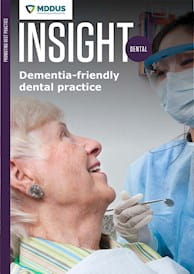BACKGROUND
A dentist, Dr P, emails the MDDUS advisory service in regard to a disclosure request from social services.
The letter states that a 9-year-old patient – Kate – is subject to a single assessment order under section 17 of the Children’s Act 1989. Social services is asking Dr P to advise them of any WNB (was not brought) appointments or other concerns regarding Kate’s health and welfare.
The letter further states that Kate’s mother (who is also a patient) has consented to the disclosure.
Dr P asks for advice on whether it is okay to reply to the request.
ANAYLYSIS/OUTCOME
An MDDUS dental adviser replies to the contact. He advises Dr P to telephone Kate’s mother to inform her of the social services letter and the context of the request, and to gain her consent to disclose the information.
This should confirm that the information relayed to social services is factually accurate.
Assuming that the mother provides additional consent, then it is acceptable to provide social services with the information requested. Dr P is advised to include only the information that has been requested and to use as little narrative as possible in answer, relying on the information held about the child patient on the practice management software.
Should Kate’s mother refuse consent to the release of the information then Dr P is advised to contact social services and, based on further discussion, decide if it would be prudent to release the requested information without parental consent. This is bearing in mind his professional obligation under the GDC Standards to take appropriate action in the event of concerns about the possible abuse or neglect of children (principle 8.5.1). Dr P is reminded that the circumstances would have to be exceptional to justify disclosure without parental consent. Principle 4.3.3 of the Standards provides that if you have information that a patient is or could be at risk of significant harm or you suspect that a patient is a victim of abuse, you must inform the appropriate social care agencies or the police.
Such a decision should be based on judgement of whether the disclosure is in the best interests of a child or young person who does not have the maturity or understanding to make a decision about disclosure.
Dr P is further advised to document the reasons for any disclosure without consent and be prepared to explain and justify the decision.
KEY POINTS
- Confirm consent with a parent or legal guardian before complying with any third-party request for disclosure of a child’s personal data.
- Disclosures without consent of a parent or legal guardian must be judged in the child’s best interests and will depend on the level of concern that may exist in relation to the child.
- Disclose only the minimum information necessary to comply with the request and to satisfy your safeguarding obligations.
- Record your decision and the justification.
This page was correct at the time of publication. Any guidance is intended as general guidance for members only. If you are a member and need specific advice relating to your own circumstances, please contact one of our advisers.
Read more from this issue of Insight Dental

Save this article
Save this article to a list of favourite articles which members can access in their account.
Save to library
